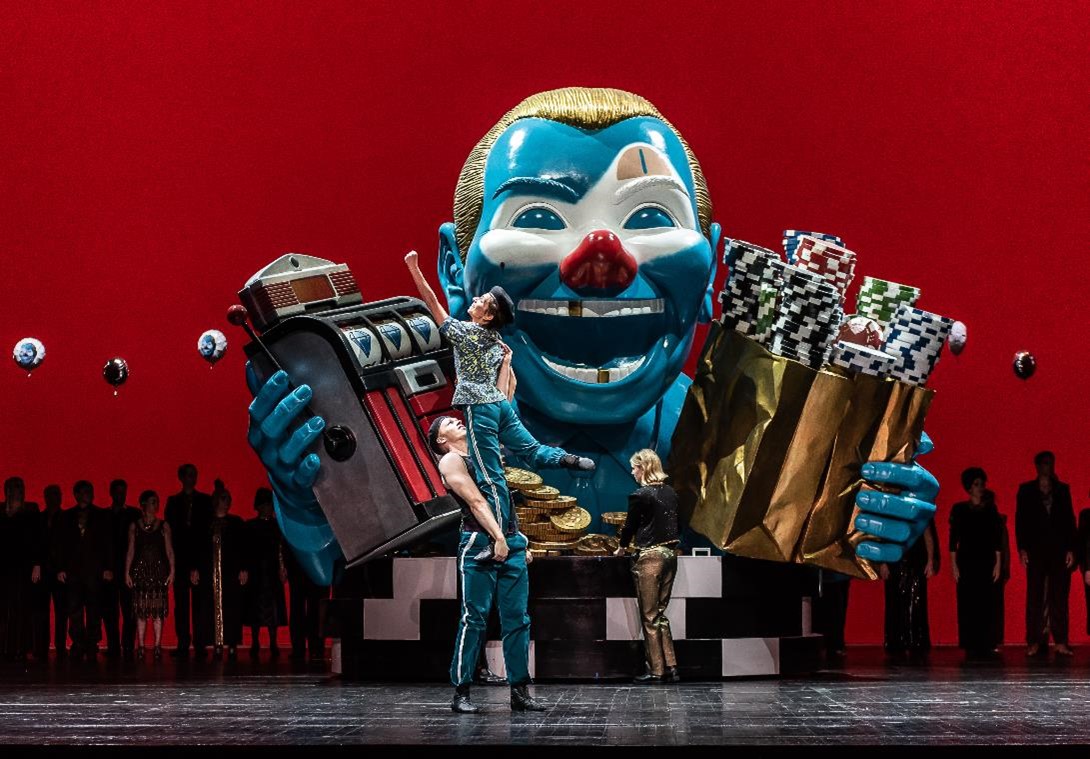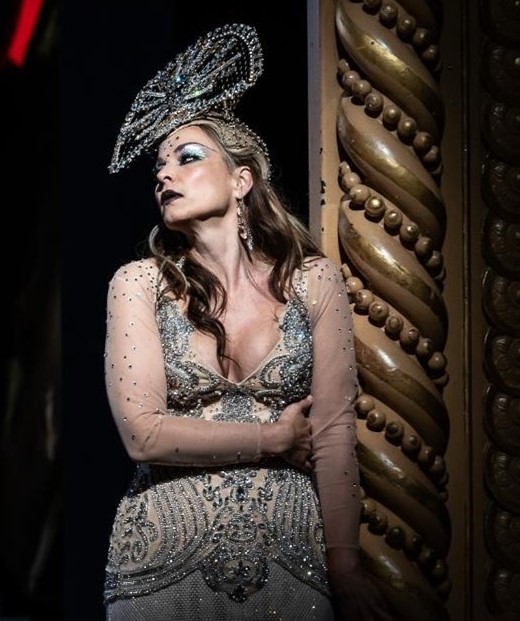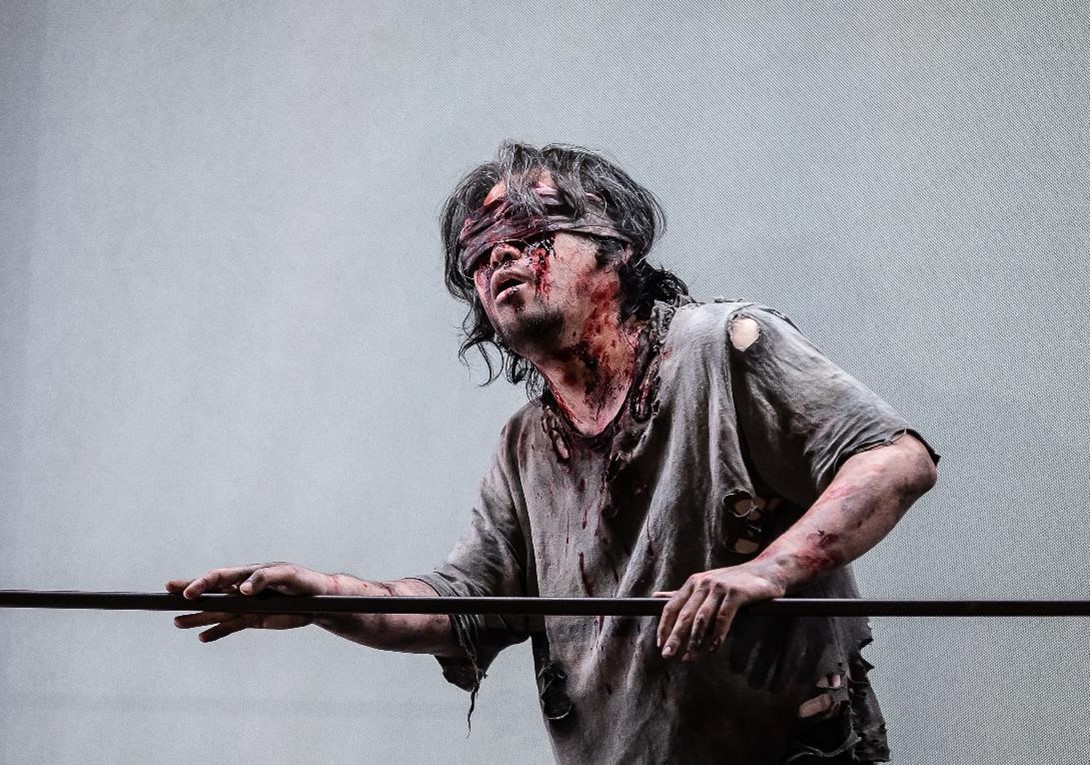Reviews
At ROH: A Dreadfully Staged, Beautifully Sung Samson et Dalila
LONDON--The Royal Opera’s artistic leaders, Oliver Mears and Antonio Pappano, have trumpeted the most celebrated opera of Saint-Saëns as “an unabashed spectacle that luxuriates in melodic invention and lush orchestration.” Unfortunately for them—and for it—director Richard Jones, England’s doyen of drab, has remained true to his current aesthetic and he has opted for a cheap and cheerless visual style. His well-documented fondness for prefab rooms and lurid wallpaper has given way to tacky vulgarity, first seen in his ugly Die Walküre for ENO and now pursued with rigor in Samson et Dalila. This production boasts the kind of dull modern dress that proclaims “that’ll do” rather than any clear sense of purpose, a slovenliness that extends to ill-assorted stage designs by Hyemi Shin and scrappy choreography by Lucy Burge—neither of whom can be blamed for obeying their master’s voice.

Plastic Las Vegas grifter as center of Richard Jones's new Samson et Dalila
Instead of Jews and Philistines, in this production the good guys worship God and the bad guys follow Mammon. That’s as profound as it gets. The sole moment of spectacle involves the image of a colossal Las Vegas grifter with a slot machine in one hand and gambling chips in the other… Yes, Mr. Jones, we get the picture. (Not that this secularized interpretation deterred opera’s bad boy from setting fire to a Star of David at one point.) The directorial concept made nonsense of a plot in which factions are divided by their fiercely held and unyielding religious positions. That’s not so plausible when Mammonites are the foe. “Let my people go,” petition the Jews (albeit not in so many words), but from what?
 Fortunately for the audience, Jones had no control over the work’s aural beauty, and here at least the Royal Opera’s new production escapes his influence. On opening night (May 26) the much-loved score by Saint-Saëns was given a performance of luster and élan by the ROH Orchestra and Chorus under Pappano, with a superb cast whose talent convinced from first to last.
Fortunately for the audience, Jones had no control over the work’s aural beauty, and here at least the Royal Opera’s new production escapes his influence. On opening night (May 26) the much-loved score by Saint-Saëns was given a performance of luster and élan by the ROH Orchestra and Chorus under Pappano, with a superb cast whose talent convinced from first to last.
As Samson, the Manhattan-trained Seokjong Baek was a revelation. Blest with a sturdily beautiful timbre, for his role and house debut the young Korean tenor created a multi-layered character and did so with harrowing force. Admittedly he was a compact Samson—I’d get long odds in Vegas on his killing a lion with his bare hands or slaying armies with the jawbone of an ass—but it mattered little, for his strength clearly rested in the impressive mullet he wore during the first two acts.
The anguish of his inner conflict when Dalila (Elina Garanca) insinuated herself into his heart was brilliantly conveyed (Jones, for all his faults, is skilled at character direction) while he sang the role with a sure voice and thrilling power. If only he hadn’t been robbed of a decent pillar-pushing climax to round off the opera… but by that point few of us were expecting one so its absence came as no surprise. (N.B. Next season Baek makes his debuts at Arizona Opera and the New York Met. Catch him if you can.)
 In an impressive cast of secondary players (several of whom didn’t even rate a mention in the program) Lukasz Golinski and Blaise Malaba stood out for their vocal resonance and physical command as Dalila’s fellow Philistines, the former as an imperious High Priest, the latter as Abimélech, a pivotal figure whose demise at Samson’s hand persuades Dalila to avenge her kinsman and destroy her long-haired lover from Israel.
In an impressive cast of secondary players (several of whom didn’t even rate a mention in the program) Lukasz Golinski and Blaise Malaba stood out for their vocal resonance and physical command as Dalila’s fellow Philistines, the former as an imperious High Priest, the latter as Abimélech, a pivotal figure whose demise at Samson’s hand persuades Dalila to avenge her kinsman and destroy her long-haired lover from Israel.
Garanca led the charge throughout with a complex, absorbing and ultimately sympathetic account of Dalila, a role she has sung many times. The Latvian mezzo-soprano generated stage magic where there had hitherto been none and transcended the opera’s visual poverty with a performance of sublime allure. She sang her great aria “Mon coeur s’ouvre à ta voix” with an improbable combination of beauty, vulnerability, and magnificence, an unforgettable moment of artistry that deserved a worthier context, yet her character’s wheedling hypocrisy cut through with lethal intent. Such a Jezebel, that Delilah.
Pictures: Elina Garanca as Dalila; Seokjong Baek as Samson
Photos by Clive Barda





 FEATURED JOBS
FEATURED JOBS

 RENT A PHOTO
RENT A PHOTO


